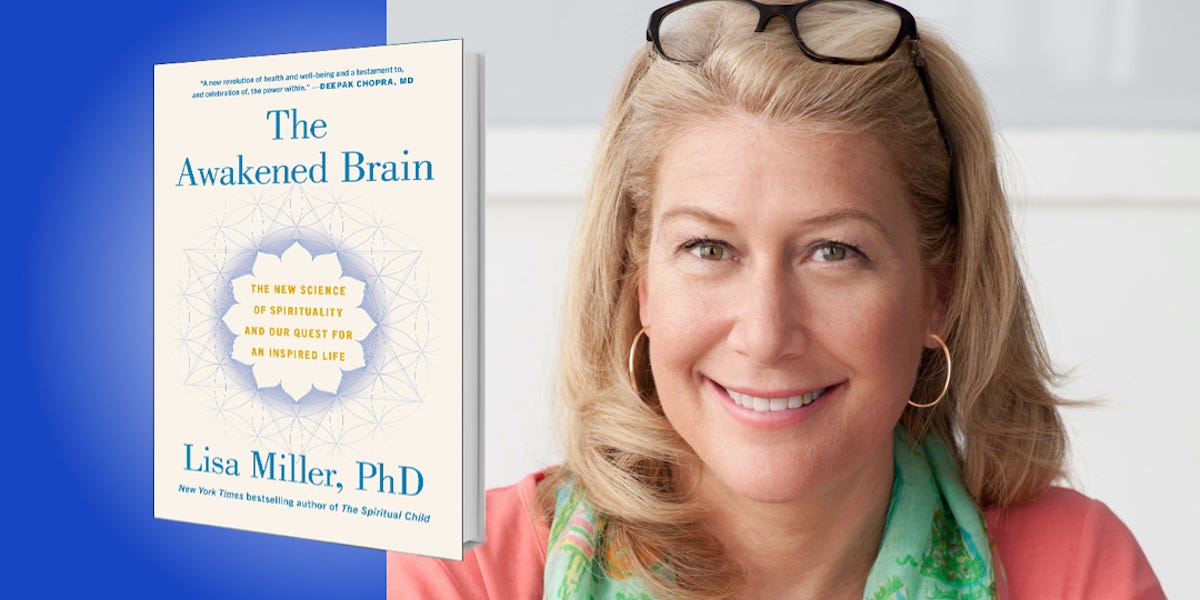FROM PARTICLES TO WAVES
Understanding Spirituality through the frequency of Quantum Physics and La La Land... Part 1. Religion vs Spirituality
A special thanks to Dr. Lisa Miller. I listened to a talk she gave on a panel Rise organized last year. She kindly answered some of my questions. This article series was inspired by and based on her ideas and research shared through her book The Awakened Brain: The Psychology of Spirituality.1

You're there… sitting at church. There's a powerful silence. The music starts playing. Everyone starts singing. You can't explain what it is but there's this mystical aura in the air. Maybe it isn't at church but at the shore. You see the vast blue ocean, the sun almost hiding and painting the sky with various shades of purple, orange, and yellow. You might feel small, but also appreciative of what, for a moment, appears to be a never-ending space and time. It could also be in a more regular setting, at school or at home. Something you watched on Instagram reminded you of that friend from middle school you haven't talked to in years now. A couple of days later, he or she calls. You're in awe… What were the odds?? Or maybe even at a soccer game with your favorite team; the score is tied, 1 minute left on the clock… They score. The stadium roars; you can feel the floor vibrate. It is like for a few seconds, nothing else existed.
Have you ever been in one of these situations? Maybe a similar one? Either at church, in nature, through music or sports, I believe we've all sensed that feeling once: a sensation that appears to go beyond the physical, that feeling of transcendence, that, for a moment, we're connected to something bigger than ourselves. I know that for some of you this might feel like I'm talking about something unreal, something "magical", and maybe you're right, because that's just how it feels. But what if I told you that each of these experiences is a practice of our human innate capacity to live spirituality? And, what's more, what if I told you that science, more specifically Quantum Physics, (along with La La Land) can back up and help us understand this "magical" phenomenon?
Join me in FROM PARTICLES TO WAVES, a series of 4 articles in which we explore and try to understand spirituality through the frequency and music of both Quantum Physics and La La Land.
So, let's begin with Part 1, a basic discussion that pops up when talking about this topic: defining the distinction between Religion and Spirituality.
Part 1. Religion vs Spirituality
Some weeks ago I asked for your help answering two questions on my Instagram. The first day the question was "Do you consider yourself a religious person?" With 105 responses, 49% answered yes, while a slight majority of 51% answered no. One day later the question shifted just by one word: "Do you consider yourself a spiritual person?". And the poll changed too, now 53% answered yes and 47% answered no. Yes, this was probably a small change, but I believe there's some important insight we can get from these numbers.
First, I find interesting the almost 50 / 50 obtained in the poll about how many people consider themselves religious vs those who don’t. Most people on my Instagram are from Mexico, a highly religious country, with around 80% of the population considering themselves Catholics.2 However, most of my friends on Instagram are between 15 and 22 years old, which aligns with the current global tendency of new generations to be less religious.3 The reason for this?… The greater exposition to technology and scientific thinking? The accelerated lifestyle we live in today? I'm not sure, I think we can all personally have our reasons, and this could give us room for a whole other article. The main takeaway for now is that it is a fact that we are less religious than before, or than our parents and grandparents, but what about our spirituality?
It's easy to think of religion and spirituality as interchangeable words. However, our poll showed how the simple shift of that word made more people answer yes to the question. This might have to do with a sense of the strong connotation the fact of "being a religious person" can carry. This makes a lot of sense since the definition of religion itself is "the structured system of beliefs that relate to a sacred divinity and shape a community's understanding of existence, purpose and ethics"4. Note the word "structured" here. Visiting church every week and following specific rules and guidelines might feel like a daunting responsibility that many, especially younger generations, don't consider parts of their lives. But how could some people not consider themselves religious while still considering themselves spiritual?

In her book, The Awakened Brain, Dr. Lisa Miller defines spirituality as humans’ innate capacity to connect with something bigger than ourselves, guiding us to understand existence, purpose, and ethics. I find this a beautiful definition. Note that it is very similar to that of religion, both guide our understanding of why we're here, what we are here for, and how we should live. However, the main difference is that the first is a "structured system of beliefs" while the second is a "human innate capacity". And yes religion is one way to connect with something bigger than ourselves, but we might not all be religious. We are all spiritual beings though; it is a capacity we're born with as human beings, even the 47% who answered no to my poll. It is just that sometimes we forget we have it or we just haven’t found a way to practice that capacity.

Dr. Keneth Kendler, a world-renowned psychiatry-epidemiological researcher, applied statistical analysis in twin studies to examine to what degree is spirituality a genetic or a socialized trait.5 He found that while 71% is formed by our environment, roughly one-third (29%) is inheritable. Yes, spirituality is mostly socialized, but that 29% is significant to show us that it is inherited to some degree. Spirituality is an innate trait; the ability to connect with something greater than ourselves is built into our DNA just by the fact of being humans.
But how exactly do we do this? How do we connect with something greater than ourselves? Well, here's where Physics comes in…
Don’t miss Part 2 of FROM PARTICLES TO WAVES coming out next Friday, where I dive into these questions, using Quantum Physics to help us understand the surprising mechanisms behind spirituality.
Don’t forget to subscribe to my newsletter! And if you’re subscribed already, don’t forget to check your email as you’ll get the article directly to your inbox!
Dr. Miller is a well-known scholar from Teacher’s College at Columbia University. If you’d like to read more about her work on psychology and spirituality you can easily find some of her publications and books such as The Awakened Brain, which I deeply recommend! Here I’m attaching a starting point.
According to INEGI (the National Institute of Statistics and Geography in Mexico), 78% of Mexicans consider themselves Catholics as of 2020. However, this percentage has been decreasing throughout the last few decades. You can read more about this here.
This study shows how young adults around the world are less likely to identify as religious than older adults nowadays.
The credit for this definition is ChatGPT. Yes! ChatGPT. I know this might be ethically questionable. However, while I tried to find other definitions in dictionaries and other sources, AI created the one I liked the most. I loved how it defined it using “existence, purpose, and ethics”, which gave me the idea to dive deeper into these three aspects when explaining spirituality later on. This reinforces my belief that if used properly, AI can be a powerful tool in learning and creativity. You can read more about my ideas on this in this previous article. If you want a dictionary definition of religion here’s the Merriam-Webster one which is essentially the same, but I still like ChatGPT’s one better.
Dr. Keneth Kendler's epidemiological study on “Religion, psychopathology, and substance use and abuse” from the American Journal of Psychiatry.



